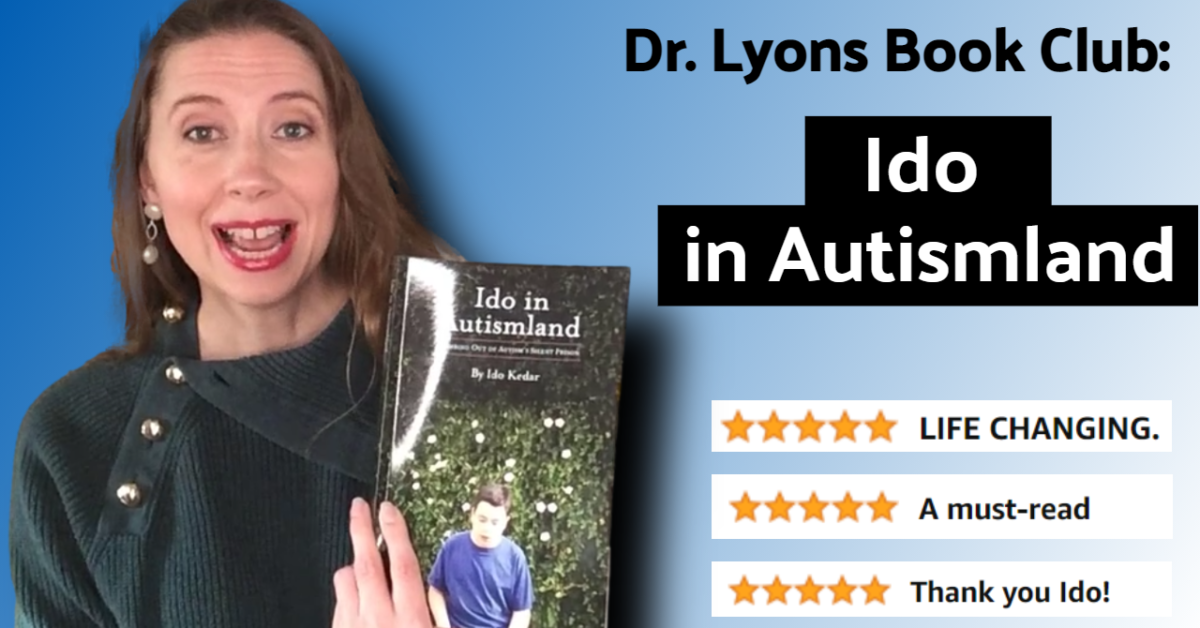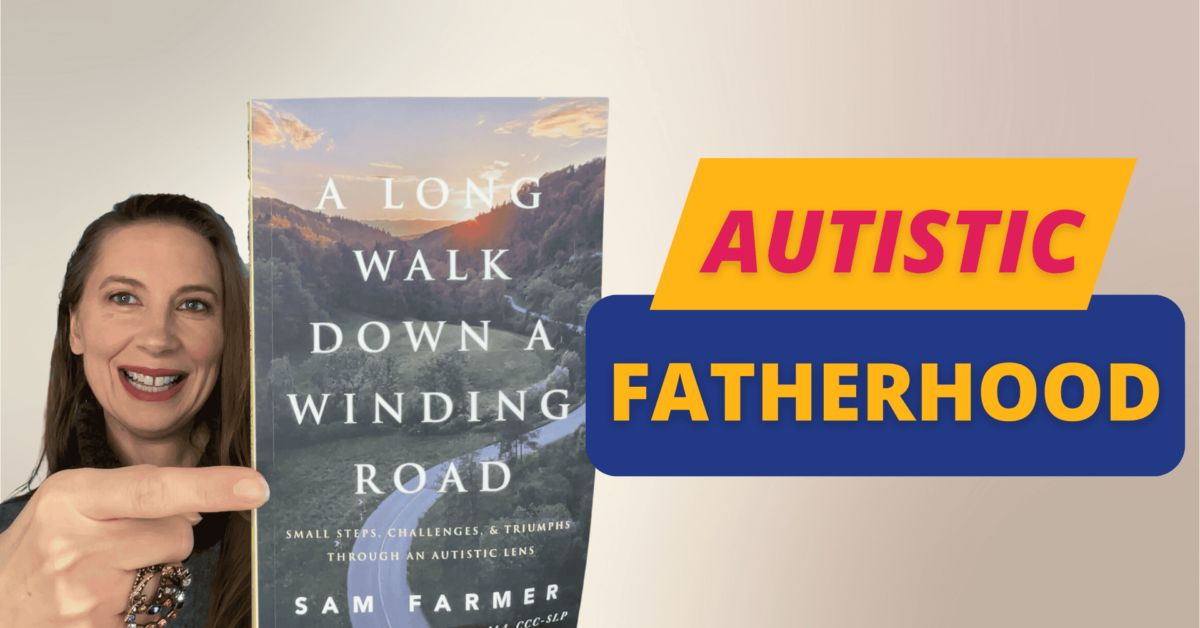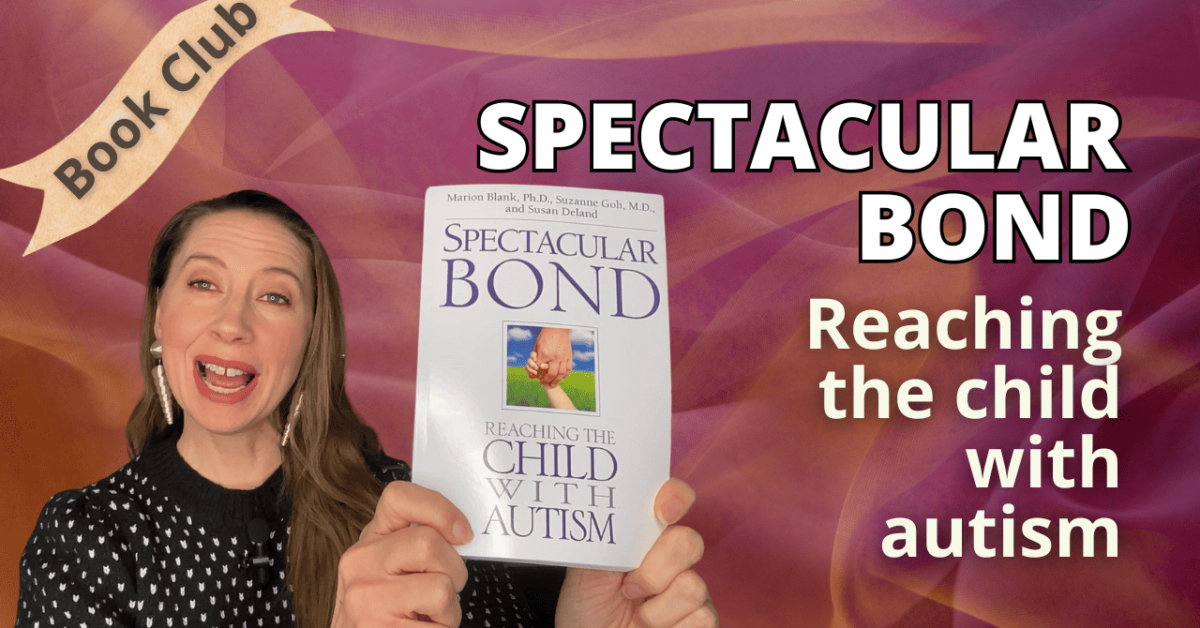This month’s book club is:
Ido in Autismland- Climbing Out of Autism’s Silent Prison
Welcome to our Book Club! Thank you for voting on this month’s book. If you’d like to vote for next month’s book, please join my email list here.
Has your child ever done something with, let’s say, hand over hand or some type of support and then you ask them to do it on their own, and they can’t do it? I’ve got some insight for you.
Let’s get into this book. It’s a great book, I have been following Ido probably for 6-8 years, something like that!
He is a great blogger. I love his website. I share it with those who are on my email list. So I’m so excited to present this book today.
This is a pivotal point of “Wait, my child could do something when there’s support, but can they really do it?”
All right. Let me give you some insight here. So this is from the parents:
“When my husband, a scientist, came home, I was excited. ‘He understands!’ I exclaimed.”
“I told him what had happened. I remember my husband’s skeptical face. He asked the questions we had been taught by the professionals. What happens if no one touched him? Why would he be able to do something with support that he can’t do alone? Do you think you might have been inadvertently prompting or manipulating him?”
She goes on to say, “I don’t think so, but I was nervous, Ido and I tried the exercise again without me supporting his arm or touching him, this time with high stakes. This time his pointing was random. He had none of the targets. I guess you’re right. He doesn’t seem to understand. I don’t think I was moving him, but maybe I was.” The mom confessed.
Ido writes “Hope slipped away from him at that point, and he died a little inside.”
“I think part of me died, too.” The mom wrote.
And you might be in that same situation even right now. I remember doing this with my daughter thinking, wait am I somehow helping? Like, how is she getting this, all right? I’m just like holding her wrist or like holding her elbow. And then eventually I’m just like, kind of touching her shoulder.
How can you do something like that & be so accurate.
And then when you remove all supports, then it’s just like blah, blah, blah, like nothing can happen.
So if you’re in that situation, please know that it’s happened to others. And that’s not a dead end. Right.
Ido went on to write a book and express himself. Actually two books now!
So if you’re experiencing that with your child, like, “Wow, it must be me who’s really prompting them to give the right answers.” I don’t think so.
ABA – What’s not good
Okay, here is what Ido writes about ABA supervision. This is him writing:
“In ABA supervision I had to do drills in front of a supervisor with all my teachers. Then they talk about me in front of me to decide how to improve my performance.
“It’s miserable to be an object of study, especially because they never realized I understood what they were saying.“
“The consequence of testing me in front of people is that I grew embarrassed and ashamed inside by analyzing me in front of me – usually wrong.”
“I grew resentful.”
“It was so frustrating. I don’t like remembering it to tell it right now.”
“It’s over for me, Thank God, but not for other kids.”
“So I have to share this to help them too.”
“My advice is that it’s not important to discuss the child in front of him like he can’t understand or has no emotion. Try to imagine what it feels like to be in that situation week after week.”
How critical is that?
How many times do we mistakenly talk in front of our child about them or the teacher or the therapist is just talking as if the child’s not there?
It happens so many times.
Your child with autism, whether they’re speaking or not, understands what’s going on around them.
And they want to succeed as much as possible.
So don’t talk about them while they’re around. It’s really disrespectful.
How Stimming & Communication Are Related
Here’s a little insight on stimming. I know that’s something that many parents wonder about. And, you know “How can I stop it?”, “What’s going on?”, “What does that mean?” And Ido writes:
“Before I could communicate, I was often there in body, but not in spirit.”
“I understood most things, but I knew I was trapped and could not show I understood.”
“It forced me to stim more because I had to live inwardly, even if I thought about interesting ideas. Since I couldn’t share them, it was pointless.”
“Once I had communication my world opened. If I had any interesting thoughts, I could tell my mom or someone.”
“This made me hopeful and interested in learning more.”
“It’s really miserable not to have communication.”
“It’s so awful. It’s hard to explain to someone who can talk, gesture or write because a non-verbal autistic person can’t do any of these things at all. It’s like living behind a wall of isolation. I survived by stimming or TV or hugs from my loved ones, but I became me once I could express my thoughts and connect intellectually with others. It is awful to remember those days, so I’m stopping now.”
That is extremely powerful I’d say.
Letting go of the past as life gets better
All right, now let’s jump to age 13. And he’s starting to let go off the past. That’s the title of this section.
And I will quote him:
“As you read, When I was 12, I still had the resentments of many years of silent frustration brewing in me. Internally I was struggling to move on emotionally and to feel happier. But I needed to deal with my early misery when my autism stopped me from being educated at the level I needed.”
“As I started seeing success in my daily life and came to analyze my autism more, I began to feel more and more hopeful.”
And this allowed me to begin to let go of my anger.”
And that is so true. This happens many times with the different clients I have as their child starts to flourish, starts to be able to do certain things to express their intelligence and their competency. There sometimes is this period of anger and frustration that, you know, “Why did it have to take this long?” And all of the hurt that they understood back then but still couldn’t express it.
So it’s really important to understand that as you do things for your child and as they start to get better and better, they are going to have to deal with those emotions that they experienced when they were younger and they had no way of doing anything with it.
But if they’re angry, what could they do? How could they express it if they did certain behaviors, sometimes they got in trouble.
So it’s really important to have an understanding that as things do get better, sometimes there is this period of having to let go a lot of those emotions. And it’s no different from anybody else who has gone through a really frustrating situation.
So, again, it’s about having that understanding of what your child is going through and giving that room to express it and to work through it.
Autism Communication Challenges
And here Ido writes about communication issues, he writes:
“I wish I didn’t need to rely on others for external support so much, but I do.”
“So I’m resigned to it, but I continue to try to overcome it anyway. It’s sort of a curse because we all autistic people require so much support to function and to emerge from our silent prison that many people miss our potential. And see only failure and limitations.”
“In so many cases, we are denied even minimal support in communication, and so we can’t emerge at all. It’s so sad to see my friends be so misunderstood all the time.“
And that’s that’s the truth. So many people with autism, whether they’re speaking or not, are misunderstood for a variety of reasons.
Overwhelming impulses in autism
And now, if your child has ever done anything where you were like, “Why did you do that?” This will provide you insight. And I’m going to quote:
“The overwhelming impulses” is what Ido called this. And here we go:
“I’m a strange mixture. I am smart as a mind and dumb as a body. I can think of insights and my body ignores them. I can write of intelligent ideas and my body acts on non-thinking impulses. It’s embarrassing and discouraging and I hate it.”
“I live in a world of high thoughts and primitive impulses, so I impulsively pour things down the drain or open things I shouldn’t because I follow my body in these moments. My mind tries to stop me. It is overpowered.”
“I regret my actions afterwards, but that does not change what I did.”
“It’s worse if I’m tired or sick or weak in some way.”
“Now I see it as robbing me of my freedom to live normally.”
“Normal people don’t get these horrible moments of compulsion.”
“Sure, they eat too much and things like that, but they don’t pour colorful things down the drain and things like that. Today I was on a roll. I poured mouthwash in the sink, shaving lotion on the mirror and salt scrub in my room. It’s hard to say why. I obey. That’s all.”
“What I need to do is fight harder, I fight my body non-stop anyway.”
“If I didn’t, I’d be getting into even more trouble. So I need to try, especially when the obsessions make me weak. If I can overcome the compulsive behavior, I’d be in a good place.”
And you might be experiencing this with your child. They might be pouring stuff, making spills and doing all kinds of things, all these impulsive things. And you’re just like, whyyyyy?
He doesn’t know either. But he tries as much as possible not to do them. His mind is like, don’t do it. But his body’s like, do it. And unfortunately, his body wins out.
So in those moments when you are a parent and you kind of stumble upon this, just try to remember this passage, and hopefully you can just kind of clean it up and move on.
Because your child didn’t want to do it. You didn’t want them to do it. So sometimes just clean it up, keep going.
It’s not polite so don’t do this
The last passage I’m going to quote, I absolutely love this. I know I’ve been saying that about this book a lot. I really love this book. The last passage is titled “It’s Not Polite”, and he writes:
“Today, I observed that I am hardly the only autistic person who compulsively grabs food. I got together with a group of autistic friends who are all non-verbal and all communicate by typing.”
How awesome is that? I wish they would write a book on that like group hangout stuff. How cool would that be? Right.
“I guess sometimes it is necessary to see others do what you do, to realize it is really not okay. I tend to grab appetizing things sometimes, even if it is from somebody else’s plate.”
“I know it is bad manners.”
“I have been told this many times.”
“But impulsive behavior is not thinking behavior. I saw that my actions are not really acceptable when I saw others do the same. One mom had a drink that looked colorful. Two kids drank from it before she could stop them. The mothers of the drinkers were embarrassed and I thought, I’d do that.”
“Then another family arrived and in seconds the son grabbed my mom’s sandwich and took a bite. Too fast for her to stop them.”
“At first, she said, ‘It’s Okay.’ when the embarrassed parents apologized.”
“Then she said, I actually don’t like it when people tell Ido it’s Okay, because it’s not. I want them to correct it.”
“The parents agreed and said that people should take more offense now that their son is older.”
“So after that, my mom told the boy that he shouldn’t have bitten her sandwich and that it is not Okay to take food from her plate.”
“I think people need to do this more.”
“My feeling is that people shouldn’t excuse our bad behavior because we are disabled.”
“When we are rude, we need to be told that clearly and not enabled by understanding polite tolerance of something that is not acceptable. My mom wouldn’t have let a dog snatch her food, let alone a human. But we tend to be too forgiving if people have autism.”
“Don’t worry, we can take the correction.”
That is absolutely great insight. I really do hope you get this book. I enjoyed it. This is a great insight. He is a great writer.
He has two books. So, certainly check out both. And I hope this also provided you insight to your child.
They’re smart, they’re capable. They want to be successful. They want to succeed. They want to have fun. But many times there’s just certain obstacles.
Hopefully you can find a way for them to communicate so that you can tap into the brilliance of who they really are!




